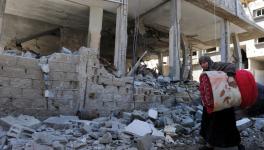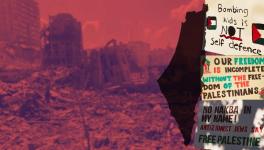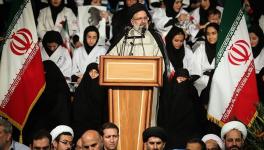Why Syria
History repeats itself. Not as a farce; but as tragedy. Those who witnessed the White House-led propaganda against Iraq in the run-up to the 2003 American war on that country cannot miss the startling similarities between those days and the past few ones. Replace Iraq with Syria. It’s almost a reloading of history. If Iraq was part of a larger American plan to reshape the Middle East, irrespective of what all the explanation the Bush clique and the neocon media were distributing, the real reasons behind a possible Syrian war cannot be different.
This time the target is Iran, and to weaken the geopolitical standing of Russia. Syria has been the most trusted ally of Iran for years. And it’s also a key link between the Hezbollah, the Lebanese Shiite group, and Iran. The Islamic Republic sends weapons and cash to the Hezbollah through Syria. The Hezbollah is an effective threat to any future American/Israeli plans to attack Iran. In the wake of a future strike on Iran, the Hezbollah could open a new front on Israel’s northern border. A master in asymmetrical warfare, the Hezbollah has fought long battles with Israel in the past. It successfully resisted Israel’s occupation of Southern Lebanon for long 18 years, forcing the “most powerful country in the Middle East” to end the occupation unilaterally in 2000. Six years later, Hezbollah again resisted a month-long Israeli bombing and ground operations.
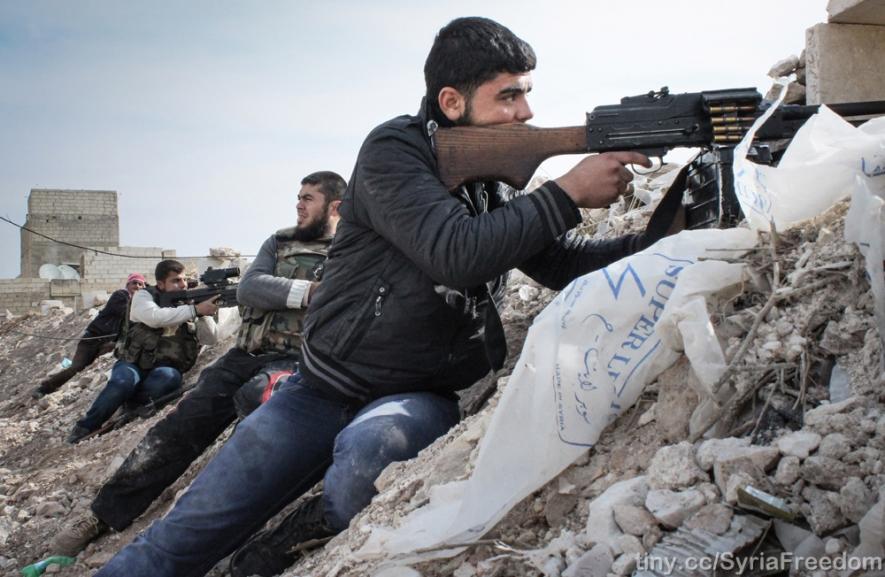
image Courtesy: flickr.com
A fall of Bashar al-Assad would break a vital link between the Hezbollah and Iran, thereby potentially weakening both. That’s a bonanza for the war trinity of the Middle East—the US, Saudi Arabia and Israel. While Americans and Israelis see the Iran-Syria-Hezbollah axis as a potential threat to their future plans for the region, Suni Saudi Arabia and its protégés in the Gulf are opposed to the Shiite Iran on both sectarian and geopolitical reasons. When protests broke out in Syria in 2011, these powers smelled an opportunity. Qatar—a tiny country “with 300 people and a TV channel” as Saudi intelligence chief Bandar Bin Sultan termed it—moved swiftly. Saudi Arabia followed suit. Atlantic powers soon stepped into the theatre with money and weapons.
President Assad’s brutal methods to quell protests against his regime offered this Gulf-Atlantic axis more legroom to maneuver. Their calculation was simple—let Syria bleed in a prolonged civil war. Initially, the Saudis and Qataris worked together through a command centre in Turkey to buy and distribute arms to the rebels headed by General Salim Idriss. Later, they set up an operation centre in Jordan in mid-2012, including an airstrip and warehouses for arms. In September and October, the Saudis approached Croatia to procure Soviet-era arms. The Central Intelligence Agency (CIA) has started training select rebels at this Jordanian facility. According to a Wall Street Journal report, there are more CIA operatives at the Jordan base than Saudi personnel. The same report says, since early this year, the CIA is paying salaries to top fighters in the Free Syrian Army, the key western-backed anti-Assad force. Earlier this year, Europe lifted a ban on supplying weapons to the rebels. It was followed by President Obama’s decision to send weapons to the anti-Assad troops.
Still, the Syrian government is winning the war, gradually though. Earlier this year, it reclaimed Qusayr, a key town on the Lebanese-Syrian border which had been with the rebels for more than a year. The regime made substantial advances in Homs, which was also under the rebel influence and is making progress in its march towards Aleppo. The government has strong hold in the Mediterranean costal areas and in central Damascus, the capital city. The rebels, on the other hand, are divided. Their political leadership is clueless and is often for waiting signals from foreign capitals. And in Aleppo, the al-Qaeda-backed al-Nusra Front is already flexing its muscles. It’s a chaotic scene, where the government has some edge. Then came the chemical weapons attack claim.
The Plan
The Assad government says it’s rebels who used chemical weapons. Backers of the regime asks why it should use such weapons at a time when it’s already making gains in the civil war. Regional analysts say Assad is not a fool to breach the “Obama red line”. The government has allowed UN inspectors to visit the attack site, eastern suburbs of Damascus, and collect samples. The inspection is going on. Meanwhile, John Kerry, the US State Secretary, has already pronounced his verdict. He says America has “little doubt” that Assad is behind the attack. The Syrian government’s decision to allow UN inspection is “too little” for the Obama administration and it’s going ahead with a war plan. According to international reports, attack on Iran could start as early as next week.
Look at the map. At least four US cruise missile-carrying destroyers are already there in the in the Mediterranean Sea. The UK has sent at least one cruise missile-carrying submarine. The North Atlantic Treaty Organization, which has already bugled war songs, could fire Patriot missiles into Syria from its base in Turkey. The US military base in Jordan could also be used to fire Patriot missiles. The USS Harold S Truman aircraft carrier battle group is based in Indian Ocean. American bomber jets could take off from this carrier, fly over the Gulf countries, straight into Syria to destroy its targets. Moreover, a US fleet based in the Persian Gulf could become another base for the attacks. Besides, the operations centre in Jordan could coordinate enhanced with rebel General Idriss (yes, “our man in Syria”, according to The Washington Post) for enhanced ground attacks against the government troops.
Gates of hell?
What the West is planning is a massive attack. Because they know Assad is not Moammer Gadhafi. Assad is not Saddam Hussein either. Both Gadhafi of Libya and Hussein of Iraq were leaders of isolated countries. Though countries like Russia raised concerns over the Iraq and Libyan wars in the UN, they did not interfere in Western plans. But Syria is embedded in a strong alliance in the region and any attack on that country has the potential to spread the crisis beyond its borders. Market speculators know this better than the policy makers in the West. Ever since the Western talk on Syria hardened, crude oil prices jumped new highs in the international markets. On Wednesday (August 19), Benchmark Brent crude oil rose 1.5% in London to settle at $116 a barrel, a six-month high. Analysts say it could go up to $140 a barrel if supply lines are broken due to the war. Waves of fears reached even Indian shores where domestic currency plummeted on, among other factors, fears of worsening the macroeconomic scene in the wake of a further jump in oil prices. Indian currency saw the sharpest fall in 22 years on August 29 to close at 68.8 against a dollar.
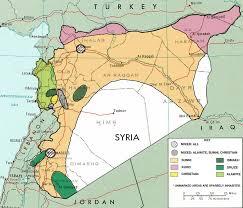
Image Courtesy: en.wikipedia.org
Syria is not a major oil producer. But it sits in a strategically important region and its greatest ally is Iran, a key member in the oil cartel, Organization of the Petroleum Exporting Countries. Iran has already warned against any military intervention in Syria. There were reports that the Revolutionary Guards of Iran were already present in Syria’s battlefields. Iran knows what’s at stake. So is Russia, whose only naval base outside its sphere of influence (former Soviet republics) is in Syria--the Tartus base on the Mediterranean Sea. For the Hezbolla, any attempt to unseat the Assad regime in Damascus is an extistential threat. Becasue, once Assad is gone and supply lines from Iran is broken, Israel could target Hezbollah again. So, a war on Syria could soon conflagrate into a regional war, whose ramifications will be beyond one’s imagination.
The fall of Saddam has thrown his country into a deadly cycle of conflicts which still bleed Iraq. The fall of Gadhafi has strengthened Islamist radicals in Africa, who are now a threat not only to Libya, but to a wider region. There was not a long gap between the Nato-led Libyan war and the Algerian hostage crisis, which was followed by France’s invasion of Mali to stop Islamists from taking over the country. French troops have driven Islamists in Mali underground. But for how long? In Syria, extreamist forces are already strong and they even control some territories. Any external attempt to weaken the Assad regime will certainly strengthen the hands of these forces. What Obama is going get out a war? An Afghanistan in the Middle East?
Is Bush still in White House?
Alexei Pushkov, chair of the Russian Duma's international affairs committee, recently said: "To us, it looks as though (George W) Bush, (Dick) Cheney and (Donald) Rumsfeld never left the White House. It's basically the same policy, as if US leaders had learned nothing and forgotten nothing in the past decade." One cannot agree more. The UN inspection is going on in Syria. Independent experts say it cannot be said now who used chemical weapons, while some say the rebels used it to prompt Americans to attack Assad.
Today’s Syria is not in Assad’s hands. It’s a geopolitical war theatre in which the CIA, the Saudis, the Jordanians, the Turks and the Qataris all present. Saudi Ariabia especially has spent billions of dollars on the rebellion. For the turmoil Syria is in today, all these powers should be held responsible. But the big powers would not take responsibility for the crisis they trigger. They are used to holding others responsible so that they can drive their strategic agenda. What’s happening in Syria is not different.
As Tariq Ali wrote in an LRB blog post, “In Iraq we know it was the US that used white phosphorus in Fallujah in 2004 (there were no red lines there except those drawn in Iraqi blood), so the justification (for a war on Syria) is as murky as it was in previous wars.” But for the Empire, murky justifications are enough. Syria could be hit anytime. Human miseries will mount. The crisis will likely spread beyond borders. It could open the gates of hell.
Dr Stanly Johny is a Delhi-based journalist. He can be contacted at stanly.mambilly@gmail.com
Disclaimer: The views expressed here are the author's personal views, and do not necessarily represent the views of Newsclick
Get the latest reports & analysis with people's perspective on Protests, movements & deep analytical videos, discussions of the current affairs in your Telegram app. Subscribe to NewsClick's Telegram channel & get Real-Time updates on stories, as they get published on our website.












